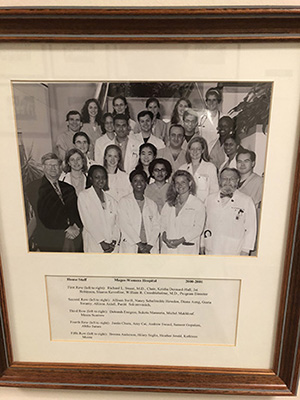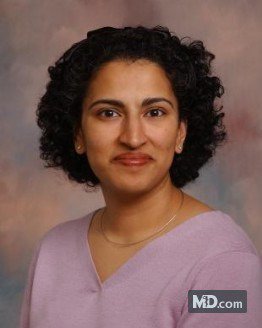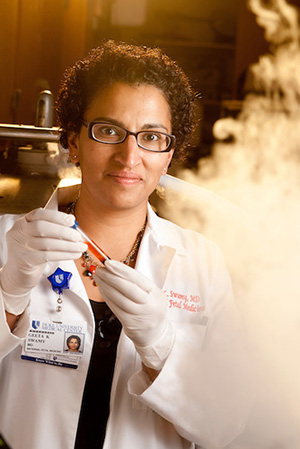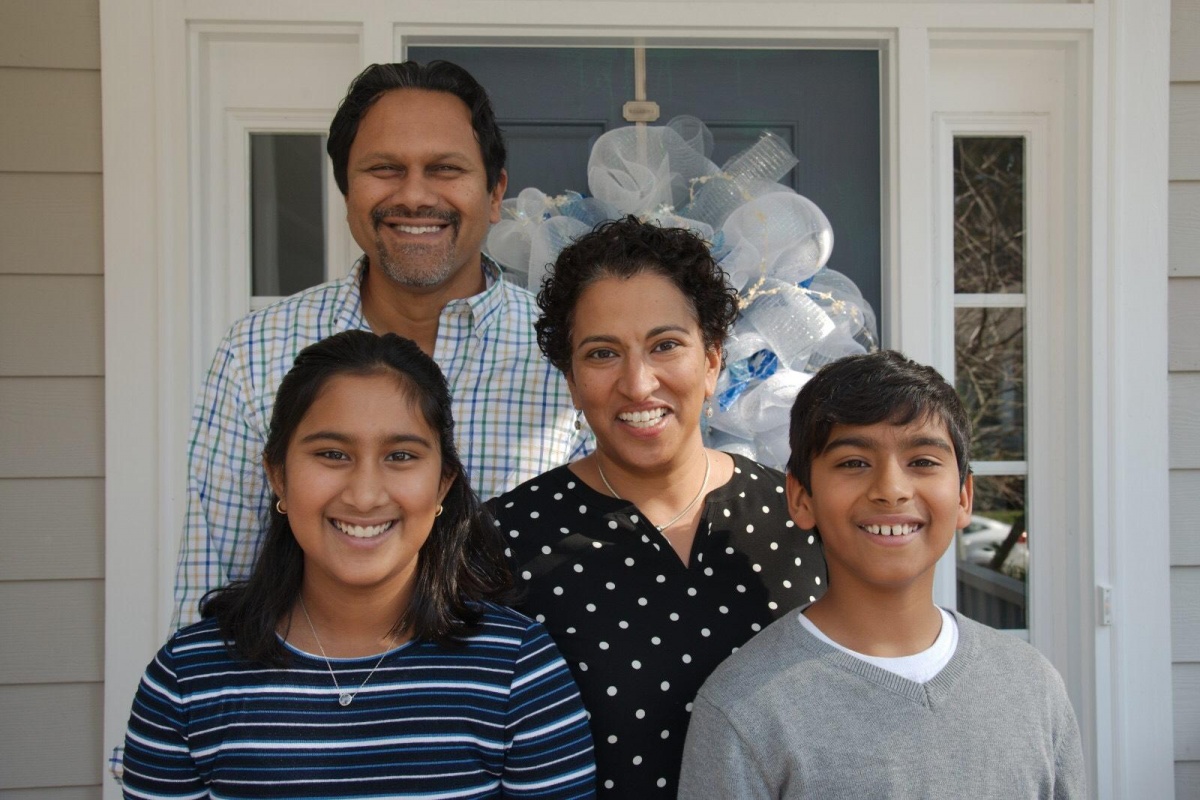
This Blue Devil Is In the Details: Meet Geeta Swamy
In January of 1996, a bitter-cold blizzard dropped more than a foot of snow on the Triangle. But Geeta Swamy, then a medical student at the University of North Carolina (UNC), climbed in her Mazda Sedan at 6 am and started a very slow but deliberate drive down Interstate 40, from her home in Chapel Hill to the site of her obstetrics gynecology (OBGYN) rotation at WakeMed Hospital in Raleigh.
When she arrived, her colleagues were flabbergasted—why had she come in these conditions?
“I’ve always been a rule follower,” says Swamy. “In my mind, it was my job to be there at my clinical rotation no matter what. No one expected for the students to come in, and some of the attending doctors weren’t able to make it. Because of that, I got to help with nine deliveries that day—it was an incredible experience.”
From that day forward, Swamy knew with absolute certainty that she wanted to be an OBGYN doctor.
After medical school, she moved north for a residency at the University of Pittsburgh Medical Center’s Magee-Womens Hospital. There, she was mentored by Phillip Heine, MD, a maternal-fetal medicine specialist internationally acclaimed for his research in reproductive infectious diseases and pregnancy outcomes.

University of Pittsburgh Medical Center's
Magee-Womens Hospital.
“It was an incredible environment to learn and work in,” said Swamy. “I have to say that of the pre-marital, pre-motherhood years of my life, my four years of residency were probably my favorite time. I really loved it there. I had great training opportunities and developed colleagues and friends for life.”
When Heine was appointed chief of the Division of Maternal Fetal Medicine at Duke, he immediately recruited Swamy back to her home state for a fellowship. Under Heine, Swamy studied how infectious diseases contribute to or cause preterm birth.
Research, especially research involving pregnant women, is an area where Swamy’s rule following prowess especially made a difference. Pregnant women are considered a special population by most federal research agencies, and research relating to them is highly regulated.
As a fellow, and then later as an associate faculty member and assistant professor in the department of OBGYN, Swamy began researching high-risk pregnancies in which a woman has a pre-existing condition or has contracted or developed one of many serious diseases such as diabetes, hypertension, asthma, sickle cell disease, HIV, or systemic lupus.
“After I left Pittsburgh, Geeta was the first fellow that I recruited to Duke and I was smart enough to give her significant responsibilities very early in her career,” said Heine. “She made incredible contributions to all aspects of the division and is directly responsible for the development of the Maternal Fetal Medicine research program.”
“Talking with patients in the clinic, I discovered that many women are anxious about taking medication or a vaccine during pregnancy for fear of harming their baby,” explained Swamy. “I knew I wanted to help these women so I, along with my mentors Dr. Heine, Dr. Amy Murtha, and Dr. Andra James, built a clinical research program focused on developing and testing new interventions for improving the lives of women and their babies."

Duke as a fellow.
Over the course of her career, Swamy has served as the principal investigator on more than 40 grants, authored more than 100 papers, and participated in the development and evaluation of a number of vaccines, including those for influenza, pertussis (whooping cough) and respiratory syncytial virus (RSV).
Probably one of the most door-opening decisions she made as a young faculty research-clinician was to volunteer on the Institutional Review Board (IRB), which oversees all human research studies at Duke. On the committee, which she later chaired, she evaluated studies across the School of Medicine relating to diseases like cancer, hepatitis C, and HIV to ensure the studies followed federally-regulated protocol - or “rules.”
“I got exposure to cutting edge research happening at Duke and all around the world,” said Swamy. “But I also learned a lot about protocol. I like to know the rules so I know that I’m getting it right.”
Her attention to “getting it right” caught the attention of Mark Stacy, then vice-dean of clinical research at Duke. He offered Swamy a position as associate dean of clinical research in which she had direct oversight of the IRB, the Office of Regulatory Affairs and Quality, and the Research Integrity Office for Conflict of Interest.
Her leadership and success in that role led Mary Klotman, MD, dean of the School of Medicine, to appoint her as the first ever vice dean and associate vice provost of scientific integrity in 2018. The position was created to provide even more support to the School’s research faculty, through increased programming, information-sharing, and mentoring.

“Geeta is the quintessential Dukie – clinically excellent, terrific researcher and a great teacher,” said Adrian Hernandez, vice dean of clinical research for the School of Medicine. “She views the world through multiple lens and integrates all of those views to make Duke better. She has been very creative to engage multiple stakeholders and constituents to change our culture by taking on difficult issues directly to improve research quality and be even more impactful.”
In August 2019, Swamy was named associate vice president for research for Duke University. She will work closely with Lawrence Carin, who was named Vice President for Research at Duke. Swamy will continue to serve as vice dean for scientific integrity for the School of Medicine.
“One of the biggest challenges facing scientific integrity at Duke and across the globe is the pressure on faculty members to produce findings in order to maintain their academic careers and secure more funding,” says Swamy.
Under Dr. Swamy’s direction, the Duke Office of Scientific Integrity provides programs that support a culture of rigor, reproducability, and responsible conduct of research Duke-wide. The office leads efforts to support researchers and promote better data management practices. It also hosts town hall meetings where topics range from tools for proposal development to mentorship to authorship best practices.
“At Duke, we have developed comprehensive responsible conduct of research training programs for researchers across campus at every stage of their career,” said Swamy.
Her advice to others, and to herself, is to not be ashamed about seeking out the help you need. There are numerous resources available through the Duke Office of Scientific Integrity.
Most of all she encourages others to recognize the importance of following the rules on a daily basis and to reap the wisdom of one of her own favorite quotes, by William James:
“Act as if what you do makes a difference. It does.”

Top portrait by Joshua Chorman. Chorman is a Video Producer/Director at the Duke School of Medicine, and manages the @dukemdprogram Instagram/Facebook page.
Lindsay Key is the science writer for the Duke University School of Medicine, and editor of the online storytelling magazine Magnify.
